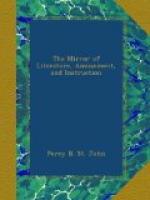The outline of the story may be briefly told. The Hon. Philip Martindale has an action brought against him, at the assizes, for the false imprisonment of one Richard Smith, as a poacher; although the object of the defendant was a beautiful girl residing with the defendant. Clara Rivolta is rudely cross-examined as a witness; whilst the plaintiff’s case is conducted by Horatio Markham, an intelligent young barrister, whose parents reside in the town where the action is tried. The cousin of the defendant, Mr. John Martindale, an eccentric old gentleman who builds an abbey for his titled relative to occupy, whilst he himself lives in a cottage on the estate; seeks an acquaintance with Markham. These parties reside at Brigland, and Philip Martindale, a dissipated lover of the turf, who is dependent on his capricious cousin for his supplies; and Horatio Markham, the hero, are thus introduced. Then we have a country curate of the higher order, together with his loquacious half; which are excellent portraits.
John Martindale is one of those eccentric beings—half-aristocrat, and half-liberal, which are more rare in society than they were fifty years since; and upon this curious compound turns the narrative. Clara Rivolta and her mother, Signora Rivolta, the wife of Colonel R. quit their native Italy, and visit Brigland, where old Martindale, on the discovery, acknowledges the Signora as the fruit of an early imprudence on the continent, and finally leaves them a large fortune. Clara is married to Markham, and Philip Martindale, afterwards Earl of Trimmerstone, marries a gay, giddy girl, who elopes with a perfumed puppy of the first fragrance.
The round of the earl’s dissipation is but a sorry picture of the prostitution of rank; but the connexion leads us into a succession of scenes of fashionable life, which are vividly drawn, as are two or three of their adjuncts,—a popular west-end preacher, an anti-nervous physician, the dandy already mentioned, a noble gambler, and a rich city knight and his aspiring family—all of which are to the life.
Our extracts must be detached from the narrative; but they may serve to illustrate the felicitous vein in which the characters are drawn.
The means by which Signora Rivolta is discovered by Martindale, is well managed. One morning after the old gentleman had been amusing his visiters with some Italian views, Mr. Denver, the curate, introduced to Mr. Martindale with great parade Colonel Rivolta, whom he described as having recently made his escape from the continent, where he was exposed to persecution, if not to death, on account of his political opinions. The reverend gentleman then proceeded to state, that the colonel had previously to his own arrival in England sent over his wife and daughter, whom he had committed to the care of Richard Smith; that with them he had also transmitted some property, which old Richard had invested for their use and benefit; that unfortunately




